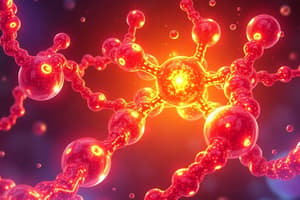Podcast
Questions and Answers
What do biochemists investigate with regards to cellular processes?
What do biochemists investigate with regards to cellular processes?
- Cellular communication and cell structure
- Cell differentiation and cell signaling
- Cell division, protein synthesis, and energy production (correct)
- Cell metabolism and waste elimination
In what field do biotechnologists apply their knowledge of biochemistry?
In what field do biotechnologists apply their knowledge of biochemistry?
- Environmental conservation and ecology
- Medical research and drug development
- Gene therapy, genetic engineering, and bioprocess engineering (correct)
- Nutrition and dietary planning
How do pharmacologists use their understanding of biochemistry?
How do pharmacologists use their understanding of biochemistry?
- To research the impact of climate change on ecosystems
- To study the actions and effects of drugs on living organisms (correct)
- To analyze the nutritional content of food
- To develop new agricultural products
What is a career that requires a strong background in biochemistry for developing dietary plans?
What is a career that requires a strong background in biochemistry for developing dietary plans?
What is an essential subfield of biology that provides a fundamental understanding of the chemical processes underlying life?
What is an essential subfield of biology that provides a fundamental understanding of the chemical processes underlying life?
What are some areas in which research scientists conduct their research?
What are some areas in which research scientists conduct their research?
What is the main focus of biochemistry?
What is the main focus of biochemistry?
Which molecules are included in the study of biochemistry?
Which molecules are included in the study of biochemistry?
What do biochemists study related to enzymes?
What do biochemists study related to enzymes?
What is metabolism in the context of biochemistry?
What is metabolism in the context of biochemistry?
Flashcards are hidden until you start studying
Study Notes
Biology: The Study of Life
Biology, derived from the Greek words "bios" meaning life and "logia" meaning study, is a branch of natural science that encompasses the study of living organisms and their interactions with the environment. The field covers a vast range of topics, from the structure and function of cells to the evolution of species and ecosystems. One of the most important subfields of biology is biochemistry, which focuses on the chemical processes that occur within living organisms.
Biochemistry: The Chemistry of Life
Biochemistry is the study of the chemical processes that occur within living organisms. It explores the structure, function, and behavior of molecules, including proteins, carbohydrates, lipids, and nucleic acids. Biochemistry is crucial for understanding the molecular basis of biological processes and diseases, as well as for developing new medicines and technologies.
Some key aspects of biochemistry include:
-
Molecular structure and function: Biochemists study the three-dimensional structure of molecules and how their structure determines their function.
-
Enzymes: Enzymes are proteins that catalyze specific chemical reactions in the body. Biochemists study the structure and function of enzymes and how they speed up metabolic processes.
-
Metabolism: Metabolism is the sum of all biochemical reactions that occur in an organism to maintain life. Biochemists study metabolic pathways and the regulation of metabolism.
-
Cellular processes: Biochemists investigate the processes that occur within cells, such as cell division, protein synthesis, and energy production.
-
Biochemical analysis: This involves the use of laboratory techniques to analyze the composition of biological samples and to measure the concentration of specific molecules.
Biochemistry in Action: Applications and Careers
Biochemistry has numerous applications in various fields, including medicine, agriculture, food science, and biotechnology. Some of the careers that require a strong background in biochemistry include:
-
Medical doctor: Doctors use their knowledge of biochemistry to diagnose and treat diseases, as well as to understand the mechanisms of drug action.
-
Biotechnologist: Biotechnologists develop new products and processes using living organisms or their components. They often work on projects related to gene therapy, genetic engineering, and bioprocess engineering.
-
Pharmacologist: Pharmacologists study the actions and effects of drugs on living organisms. Their work involves understanding the biochemical processes that drugs target and how to design new drugs with improved efficacy and safety.
-
Nutritionist: Nutritionists use their knowledge of biochemistry to develop dietary plans that promote health and prevent disease.
-
Research scientist: Research scientists work in academia, government, or industry to conduct research in areas such as molecular biology, genetics, and biochemistry.
Biochemistry is an essential subfield of biology that provides a fundamental understanding of the chemical processes that underlie life. By studying the structure and function of molecules and the processes they participate in, biochemists contribute to the development of new treatments, technologies, and a deeper understanding of the natural world.
Studying That Suits You
Use AI to generate personalized quizzes and flashcards to suit your learning preferences.




